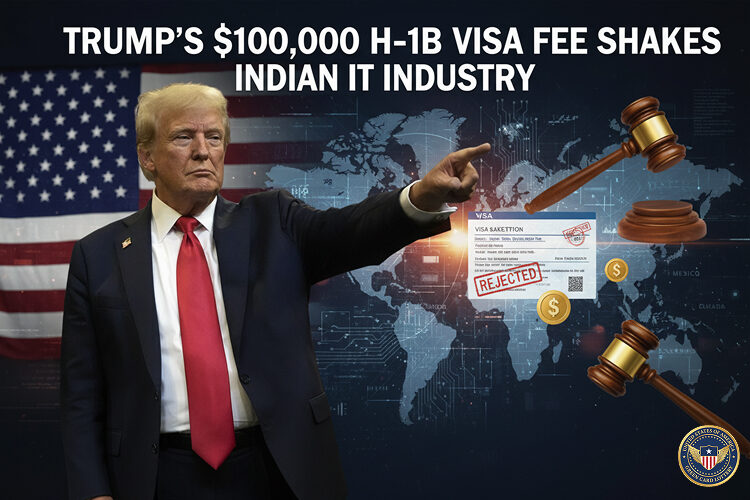
India’s $283 billion IT sector faces its most disruptive challenge in decades after U.S. President Donald Trump H-1B visa crackdown, effective Sunday. The unprecedented cost has sent shockwaves through tech firms, immigration lawyers, and economists, with many predicting a legal storm and a complete overhaul of the outsourcing model that has long underpinned India’s dominance in global IT services.
For the latest news and updates, visit our website US Green Card Lottery
Trump H-1B visa crackdown: India’s IT Industry in Crisis Mode
For decades, Indian tech giants such as Tata Consultancy Services (TCS), Infosys, Wipro, HCL Technologies, and Tech Mahindra have relied on rotating skilled workers to U.S. projects. About 57% of the sector’s revenue comes from the U.S., with Indian professionals making up 71% of all H-1B beneficiaries in 2024. China was a distant second at just 11.7%.
Now, analysts say the new fee is effectively “prohibitive,” forcing firms to re-examine their U.S. strategies. Projects with marquee clients such as Apple, JPMorgan Chase, Walmart, Microsoft, Meta, and Google may shift away from onshore delivery to offshore and near-shore locations, accelerating the expansion of Global Capability Centres (GCCs) in India, Canada, Mexico, and Latin America.
The ‘American Dream’ Slipping Away
“The American Dream for skilled workers will now be much harder,” said Ganesh Natarajan, former CEO of Zensar Technologies. He predicted a sharp reduction in cross-border travel, with companies shifting more operations to lower-cost bases in India, Mexico, and the Philippines.
Industry body Nasscom warned the move could hurt America’s innovation ecosystem, disrupt business continuity, and delay tech projects. Economists view it as part of a broader global trade and technology war, with ripple effects on supply chains and margins.
Legal Battles on the Horizon
The sudden rollout sparked panic among tech firms and foreign workers. Companies such as Microsoft, Amazon, TCS, and JPMorgan reportedly advised H-1B holders to stay in the U.S. or return before the rule took effect. Immigration lawyers fielded frantic calls over the weekend as families scrambled to change travel plans.
Legal experts say lawsuits are imminent.
“We anticipate several challenges being filed this week,” said Sophie Alcorn, CEO of Alcorn Immigration Law. “The fee is not just steep, it effectively weaponizes the visa system.”
Even after a White House clarification that the fee applies only to new applicants, lawyers expect selective sponsorship.
“H-1Bs will be reserved only for the most business-critical roles,” said Vic Goel of Goel & Anderson, warning that access for many skilled foreign workers will shrink dramatically.
Impact on Deals and Delivery Models
Industry analysts predict deal repricing, delayed project starts, and fewer client-facing roles.
“Some contracts will be re-scoped with fewer onshore staff. Others will move offshore or near-shore from day one,” said Phil Fersht, CEO of HFS Research.
The move could also accelerate the adoption of automation and AI, as U.S. clients seek cost-effective alternatives to expensive human labor.
Rise of Global Capability Centres (GCCs)
Trump H-1B visa crackdown is expected to supercharge the rise of GCCs. Once seen as low-cost back offices, GCCs are now innovation hubs for finance, R&D, and AI development.
India already hosts over half of the world’s GCCs. By 2030, the number is projected to exceed 2,200, employing up to 2.8 million professionals and generating nearly $100 billion in market size, according to a Nasscom-Zinnov report.
Time zone proximity also makes Canada, Mexico, and Latin America attractive alternatives.
“This is a new world order in services economics, more GCCs, more local U.S. hiring, and less job mobility,” said Ray Wang, founder of Constellation Research.
A Double Blow for India’s IT Sector
Trump H-1B visa crackdown shock comes as Indian IT firms are already grappling with weak U.S. demand, tariff uncertainty, and a proposed 25% tax on outsourcing payments. Together, analysts say, these pressures could permanently reshape the onsite-offshore delivery model.
Conclusion
Trump H-1B visa crackdown overhaul represents a turning point for the global IT industry. While Indian tech firms will likely rely on GCCs, automation, and near-shoring to mitigate the impact, the $100,000 fee threatens to slow deal-making, reduce job mobility, and alter the aspirations of thousands of skilled workers.
For India, the world’s IT powerhouse, the coming months may decide whether this disruption sparks innovation-driven resilience or a fundamental decline in its U.S.-dependent playbook.
👉 To get detailed help on applications and avoid mistakes, you can explore resources like the US Green Card Office

